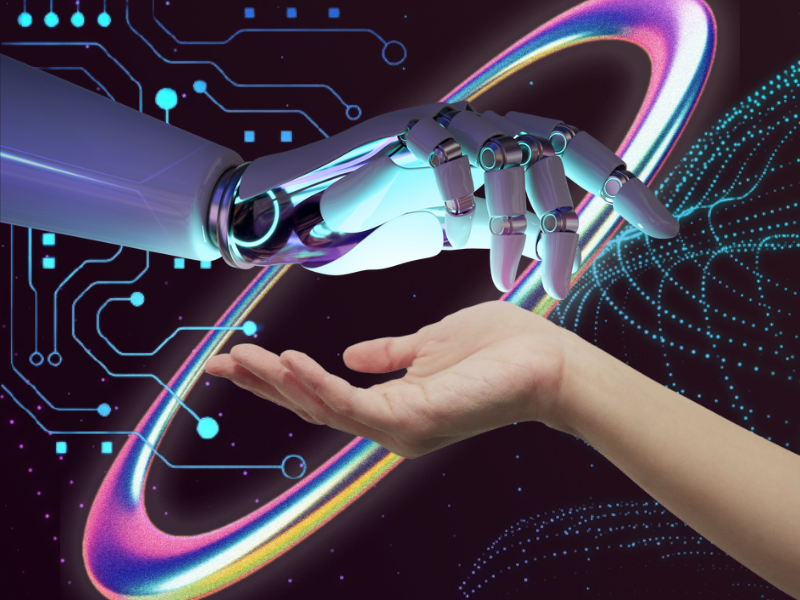Pulp Fiction in the style of Wes Anderson; Monet’s garden depicted by Edward Hopper; you as an ancient Egyptian pharaoh . . . Some of our wildest imaginations can now take material form in the digital world with the help of artificial intelligence. AI art generators consume data from all over the internet, remix and rearrange the ones and zeros, and produce a shiny new work of “art.” These tools and algorithms are fun, clever, and becoming increasingly sophisticated. However, before we continue anthropomorphizing AI and giving it human characteristics (and even human responsibilities), there are several ethical and social questions to consider. There must be a meeting of artificial intelligence and the humanities, a union between AI and the “I.”
Artificial intelligence is becoming increasingly pervasive, not only in its use and functionality but also in its capabilities of seemingly “understanding” human creativity and language. You’ve probably heard something about ChatGPT—a chatbot created by the artificial intelligence research laboratory OpenAI—which can create a story, write a research paper, and even suggest a course of treatment for a medical patient. (But please don’t turn to the internet for medical advice!) Its launch has sparked both excitement and concern. On the one hand, users are fascinated by this tool’s power; on the other, we may be wary of how this tool can be exploited. And the concerns are valid. Creativity and language shape our cultures, relationships, and overall perceptions of ourselves and how we engage with the world. When technology interacts with us while we interact with technology, we agree to a type of manipulation of our very human experiences by something not very human at all. Thus, with increasing involvement of technology in our lives, we must be more mindful of what these interactions look like, how we are influenced, and what the results are in the real world.
While using any artificial intelligence technology, it is imperative to remember that it is a tool that runs on algorithms. And although algorithms can be pretty accurate and great at capturing human characteristics, they are not perfect or human themselves (i.e. conscious). That is why it is vital to research the ethical facet of AI. Ethics guide us in answering questions such as: what is the purpose of artificial intelligence in our lives, what data is artificial intelligence using and how is it accessing this information, and what are the consequences of using artificial intelligence in all these ways? “Algorithms are trained with datasets from society, from human culture, and that is one reason why the humanities are needed. To be able to find misjudgments in an algorithm, you need to have a perception of the type of data we feed those algorithms, and you need to understand where the problems are in that data,” says Tobias Blanke, professor of humanities and AI at the University of Amsterdam (Amsterdam, 2022). There is the potential for bias at every level, prompting us to face these biases and ask ourselves the big questions.
The AI.Humanity Initiative taking shape at Emory University tackles these questions and concerns regarding the relationship between artificial intelligence and ethics. The initiative encourages scholarly collaboration across disciplines to address what is at stake at the intersection of AI and the humanities. Provost and Executive Vice President for Academic Affairs Ravi Bellamkonda stated, “Emory seeks to realize the full potential of technology to shape the human endeavor. We want to put AI into the service of humanity by using it to guide health, law, business, arts, and humanities in thoughtful, ethical, and wise ways” (Shaping the Future of Artificial Intelligence to Serve Society, 2022).
Artificial intelligence is a revolutionary technology and a promising tool for the improvement of the human condition and the advancement of society. However, it will positively contribute to our world only when utilized responsibly. Whatever artificial intelligence is currently and whatever it becomes, it is a reflection of our humanity. It is holding up a mirror, and now is the time to face ourselves and ask if we like what we see. ‘With great power comes great responsibility.’
Hey, I wonder what Spiderman would look like in the style of Quentin Tarantino . . . .
Amsterdam, U. van. (2022, February 11). AI and humanities: New intelligence with attention to detail. University of Amsterdam. https://www.uva.nl/en/about-the-uva/organisation/faculties/faculty-of-humanities/research/faces-of-humanities/tobias-blanke/interview-tobias-blanke.html
Shaping the future of artificial intelligence to serve society: Emory’s AI.Humanity initiative | Emory University | Atlanta GA. (2022, May 3). https://news.emory.edu/stories/2022/05/er_ai_humanity_initiative_03-05-2022/story.html
—Keeza Hameed, science librarian for biology and neuroscience

